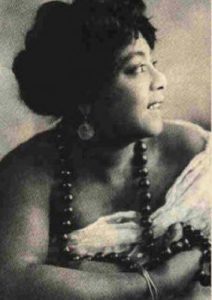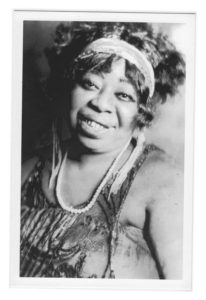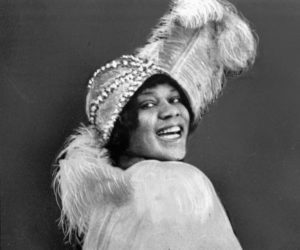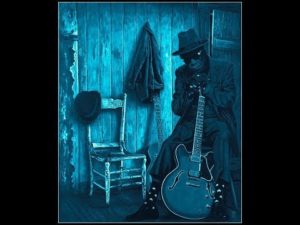What are “The Blues”?
The Blues originated in the Deep South after the American Civil War. W.C Handy, who is affectionately called the father of the Blues, met a vagrant at a railroad in Mississippi around 1903 and heard him playing music on a banjo-like instrument. This sound inspired the sound that is known as the Blues today. It’s musical style features call and response, and as such was influenced by work songs and field hollers. Due to the heavy influence of work songs in the blues, it was informally established as a male dominated genre. The word “Blues” characterizes the melancholy, depressed theme that heavily influences the music. Although Hart Wand’s “Dallas Blues” became the first copyrighted blues composition in 1912, women are responsible for the popularity of Blues music as it is known today.

Female Identity in the Blues
Mamie Smith, a vaudeville singer and dancer, in 1920, created history by recording the first Blues vocals. She is credited as formally launching the Blues as pop music. She paved the way for Bessie Smith to become a prominent figure in the genre and be affectionately referred to as the “Empress of the Blues”. Bessie Smith became the highest paid female artist during the Blues era. Her musical artistry pulled inspiration from her humble beginnings of poverty and the death of her parents at a very young age. Her struggles as a Black woman was highlighted and it shed light on the mental state of many Black women like her that experienced many hardships. Ma Rainey was another prominent female Blues artist that Bessie Smith had an apprenticeship under. Rainey was another prominent figure that sang about the struggles that Black women face and the hardships of intersectionality being an impoverished Black woman in America.

Rainey helped to inspire themes of raw female liberation that Smith expanded. Her strong voice and perspective can also be credited towards raw themes of female empowerment that are heard in modern female rap artists such as Lil’ Kim and the City Girls.
 In a male dominated industry and musical genre, Bessie Smith provided a strong sense of self awareness and celebration of the humanity of Black women.
In a male dominated industry and musical genre, Bessie Smith provided a strong sense of self awareness and celebration of the humanity of Black women.

Female Blues Legacy
Today, Black female recording artists like Jazmine Sullivan continue the legacy of Bessie Smith, Mamie Smith, Ma Rainey, and countless others that soulfully sing about the hardships of being a Black woman. These hardships often are the residual effects of racism and sexism, and Jazmine Sullivan’s latest album “Heaux Tales” delves deeply into the double standards that are placed onto women. While Sullivan’s strong perspective about the hardships of Black women are a major theme in her music, Bessie Smith’s strong willed spirit lives through Sullivan’s artistry and inspires many Black women to press on despite current hardships and hurdles.

References

